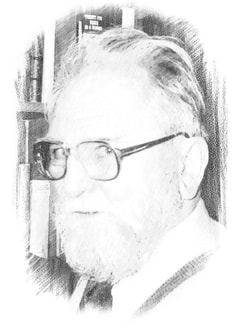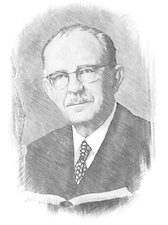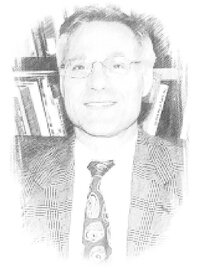D - Past-Witnesses-File
- John Davenant - Hans Werner Debrunner - M.R. Dehaan - Jack De Jong - AC Dixon - Anne Dutton -
==john davenant=================
John Davenant (20 May 1572, in London – 20 April 1641, in Salisbury) was an English academic and bishop of Salisbury from 1621. He also served as one of the English delegates to the Synod of Dort. He was educated at Queens' College, Cambridge, elected a fellow there in 1597, and was its President from 1614 to 1621. From 1609 onward, he served as the Lady Margaret's Professor of Divinity, from which he was called away by James I to represent the Church of England at the Synod of Dort in 1618, along with Samuel Ward, Joseph Hall
and George Carleton.
and George Carleton.
Whoever rightly considers how precious the death of the Son was in the eyes of the Father could not think that he would have been willing to expose his Son to death without a certain purpose of effectually applying his death to some people. --John Davenant; On the Death of Christ and Other Atonement Writings
==hans werner debrunner=====

Hans Werner Debrunner (1923 –1998) was a Swiss German historian and theologian
whose work mainly covered mission history, West Africa and the African diaspora. He also carried out academic research on history relating to missiology in northern, eastern and southern Africa. Upon his death in 1998, his private library and archive were donated to the Carl Schlettwein Foundation. The "independent, self-contained collection" comprises more than 3100 books and single journal issues on his area of specialty, published mostly in the first half to mid-twentieth century. Furthermore, Debrunner’s academic archives are a compilation of historiography and ethnography, particularly bio-bibliographies of Swiss missionaries and native African pastors and missionaries who worked with the Basel Mission in Africa. Debrunner also documented history, socio-political and intercultural relations between Africa and Europe.
whose work mainly covered mission history, West Africa and the African diaspora. He also carried out academic research on history relating to missiology in northern, eastern and southern Africa. Upon his death in 1998, his private library and archive were donated to the Carl Schlettwein Foundation. The "independent, self-contained collection" comprises more than 3100 books and single journal issues on his area of specialty, published mostly in the first half to mid-twentieth century. Furthermore, Debrunner’s academic archives are a compilation of historiography and ethnography, particularly bio-bibliographies of Swiss missionaries and native African pastors and missionaries who worked with the Basel Mission in Africa. Debrunner also documented history, socio-political and intercultural relations between Africa and Europe.
--Martin R. Dehaan-----------------
Martin Ralph DeHaan (March 23, 1891 – December 13, 1965) was an American Bible teacher, the founder of Radio Bible Class, and the co-editor of the monthly devotional guide Our Daily Bread.
 MR DeHaan
MR DeHaan
“You were not redeemed with corruptible things….but with the precious blood of Christ.” (1 Peter 1:18-19)
Among the many names given to our Lord in the Bible, one is especially dear to me. It is the name Redeemer. The word “redeem” literally means “to buy back.” It suggests that something has been sold or forfeited in order to pay a debt. When the price of its redemption has been paid, the lost article can be reclaimed. Man was created in God’s image, but he sold out to Satan for some fruit from a forbidden tree. Since that time, all mankind has been enslaved to sin and under judgment. The purchase price of redemption was the sacrificial death of Jesus Christ, which met the demands of God’s holiness. Everyone who accepts God’s gift of forgiveness is set free and becomes a slave of Christ the Redeemer (Romans 6:22). Many years ago, a man visited a slave market. He watched for a while, then bid on a slave until no one was able to go any higher. After paying the price, he gave the bill of sale to the slave, and said, “I have purchased you to set you free.” Overcome with gratitude, the slave refused to leave him and became his devoted servant for life. Jesus paid an enormous price for our salvation. Jesus gave his all for us -- are we giving our all for him? Do we serve Him out of gratitude? Let’s live free from sin in the grace of God! -Martin R DeHaan
Among the many names given to our Lord in the Bible, one is especially dear to me. It is the name Redeemer. The word “redeem” literally means “to buy back.” It suggests that something has been sold or forfeited in order to pay a debt. When the price of its redemption has been paid, the lost article can be reclaimed. Man was created in God’s image, but he sold out to Satan for some fruit from a forbidden tree. Since that time, all mankind has been enslaved to sin and under judgment. The purchase price of redemption was the sacrificial death of Jesus Christ, which met the demands of God’s holiness. Everyone who accepts God’s gift of forgiveness is set free and becomes a slave of Christ the Redeemer (Romans 6:22). Many years ago, a man visited a slave market. He watched for a while, then bid on a slave until no one was able to go any higher. After paying the price, he gave the bill of sale to the slave, and said, “I have purchased you to set you free.” Overcome with gratitude, the slave refused to leave him and became his devoted servant for life. Jesus paid an enormous price for our salvation. Jesus gave his all for us -- are we giving our all for him? Do we serve Him out of gratitude? Let’s live free from sin in the grace of God! -Martin R DeHaan
--jack de jong------------------
 Jack De Jong
Jack De Jong
"....prayer in the life of a believer is often filled with many obstacles. The power of sin and the power of the devil try to block our prayers and lead our minds away from the Lord. Confusion and laziness attack us, and often we just don't take the time to pray. We are always in a hurry. Then there is the doubt, heaviness and melancholy of our hearts — sometimes we are just not in the mood to pray, and if we pray, we pray in doubt. (Heb. 11:6, Ja. 5:3) Our cares and concerns often become an obstacle to prayer, as well as our relation to our neighbours in the Lord. For if one cannot ensure the correct relation to his neighbour, it is impossible to have the correct relationship with God. (1 Peter 3:7).
All of these obstacles are real in our life, and we experience them in a way similar to what we read in the psalms of David, and in the cries of God's people. At one time or another, we all meet with turmoil and distress. And we must struggle daily with the weaknesses of our flesh. How then can we be sure that our prayers will be heard by the Lord? When we notice how great the differences are between the sort of prayer the Lord wants and our actual prayer, should that lead us to despair? Or can we expect the differences to be removed?
Yes, we may be assured that the Lord will remove those differences, if only we trust in Him, and believe in His Name. For the Lord Jesus (lid not teach prayer for nothing; He wants His disciples to pray, not as the Pharisees did, but in the way He taught them. Prayer doesn't come naturally; it requires training and discipline to pray correctly. Our hearts and lips must be circumcised, as Isaiah says. We must continually struggle to pray as we ought to pray.
As we grow in learning to pray, the Lord still accepts our prayers, even with their many faults and shortcomings. Why? Because the covenant promises of the Lord still stand. He still listens to His people for the sake of His steadfast love, and on account of His covenant promises that were sealed to us at our baptism. We can pray today and still be heard because, as we saw, this is the dispensation of Pentecost. The Holy Spirit no longer dwells with the Father, but now dwells and works in us through the preaching of the Word. He helps is in our prayers — He leads us to the prayer bench. He gives us the words to pray, and when we can't find the words, He still prays for us.
The Holy Spirit speaks for us to the Father, on the basis of the work of the Son. For, as Paul says, "we do not know how to pray as we ought, but the Spirit himself intercedes for us with sighs too deep for words." (Rom. 8:26) And because He intercedes for us, all our prayers are answered. There is no such thing as an unanswered prayer. All else may fail, but our mumbling, our sporadic groaning, indeed, even our "brullen" will be heard by the Father, for the sake of His Son.
For He cares for us, and bends down to help us for His Son's sake. He visits us and unifies the 'ought' of prayer with our actual prayers. He unifies our words and deeds, our thoughts and actions. By the grace of His Spirit, he unifies our whole life, and so leads all of His children unto the end, when the prayers of the whole church shall be answered in full, and He will be all in all.
- Jack De Jong; Spindle Works; Prayer & The Christian 3/15/75
All of these obstacles are real in our life, and we experience them in a way similar to what we read in the psalms of David, and in the cries of God's people. At one time or another, we all meet with turmoil and distress. And we must struggle daily with the weaknesses of our flesh. How then can we be sure that our prayers will be heard by the Lord? When we notice how great the differences are between the sort of prayer the Lord wants and our actual prayer, should that lead us to despair? Or can we expect the differences to be removed?
Yes, we may be assured that the Lord will remove those differences, if only we trust in Him, and believe in His Name. For the Lord Jesus (lid not teach prayer for nothing; He wants His disciples to pray, not as the Pharisees did, but in the way He taught them. Prayer doesn't come naturally; it requires training and discipline to pray correctly. Our hearts and lips must be circumcised, as Isaiah says. We must continually struggle to pray as we ought to pray.
As we grow in learning to pray, the Lord still accepts our prayers, even with their many faults and shortcomings. Why? Because the covenant promises of the Lord still stand. He still listens to His people for the sake of His steadfast love, and on account of His covenant promises that were sealed to us at our baptism. We can pray today and still be heard because, as we saw, this is the dispensation of Pentecost. The Holy Spirit no longer dwells with the Father, but now dwells and works in us through the preaching of the Word. He helps is in our prayers — He leads us to the prayer bench. He gives us the words to pray, and when we can't find the words, He still prays for us.
The Holy Spirit speaks for us to the Father, on the basis of the work of the Son. For, as Paul says, "we do not know how to pray as we ought, but the Spirit himself intercedes for us with sighs too deep for words." (Rom. 8:26) And because He intercedes for us, all our prayers are answered. There is no such thing as an unanswered prayer. All else may fail, but our mumbling, our sporadic groaning, indeed, even our "brullen" will be heard by the Father, for the sake of His Son.
For He cares for us, and bends down to help us for His Son's sake. He visits us and unifies the 'ought' of prayer with our actual prayers. He unifies our words and deeds, our thoughts and actions. By the grace of His Spirit, he unifies our whole life, and so leads all of His children unto the end, when the prayers of the whole church shall be answered in full, and He will be all in all.
- Jack De Jong; Spindle Works; Prayer & The Christian 3/15/75
==ac dixon=========================
“When we depend upon organizations, we get what organizations can do. But when we depend upon prayer, we get what God can do.” - A.C. Dixon
==anne dutton====================
Anne Dutton (1692–1765) was an English poet and Calvinist Baptist writer on religion. She published around 50 titles and corresponded with George Whitefield and John Wesley. Her biographer, J.C. Whitebrook, referred to it as her “chief literary production.” Sixty-one of Dutton’s hymns composed on several subjects are also included in that volume. Her biographer, J.A. Jones, noted that these were written for “plain and homely folk” in the “midland countries.” Dutton’s con-tribution to evangelical spirituality, poetry, and hymnody in the Baptist tradition is significant.
 Anne Dutton
Anne Dutton
"The sin of pride is the child of unbelief. Pride springs from a disbelief of God to be what He is, in His immense and essential glory, in His infinite, underived, all-comprehending, incomprehensible self-sufficiency; and from a vain conceit of the creature’s being that which indeed it is not—that the creature is something independent of God. Whereas, without His all-supporting and all-supplying hand, it would soon sink into its first nothing, and be, as in and of itself it is, a mere vacuity, less than nothing, and vanity…Nothing like the sin of pride unfits us for divine service. It renders us incapable, so far as it prevails, of any acceptable service either to God or man." -Anne Dutton
 Anne Dutton
Anne Dutton
"By giving me frequent communion, and sweet fellowship with himself, in his three glorious persons; in the infinite, free, full, unchangeable and eternal love of the Three-One God, displayed in and through the man Christ Jesus; as that which gloriously encompassed me in one eternal round. Thus highly was I favoured for many years."
—Anne Dutton, A Discourse upon Walking with God (1735)
—Anne Dutton, A Discourse upon Walking with God (1735)

